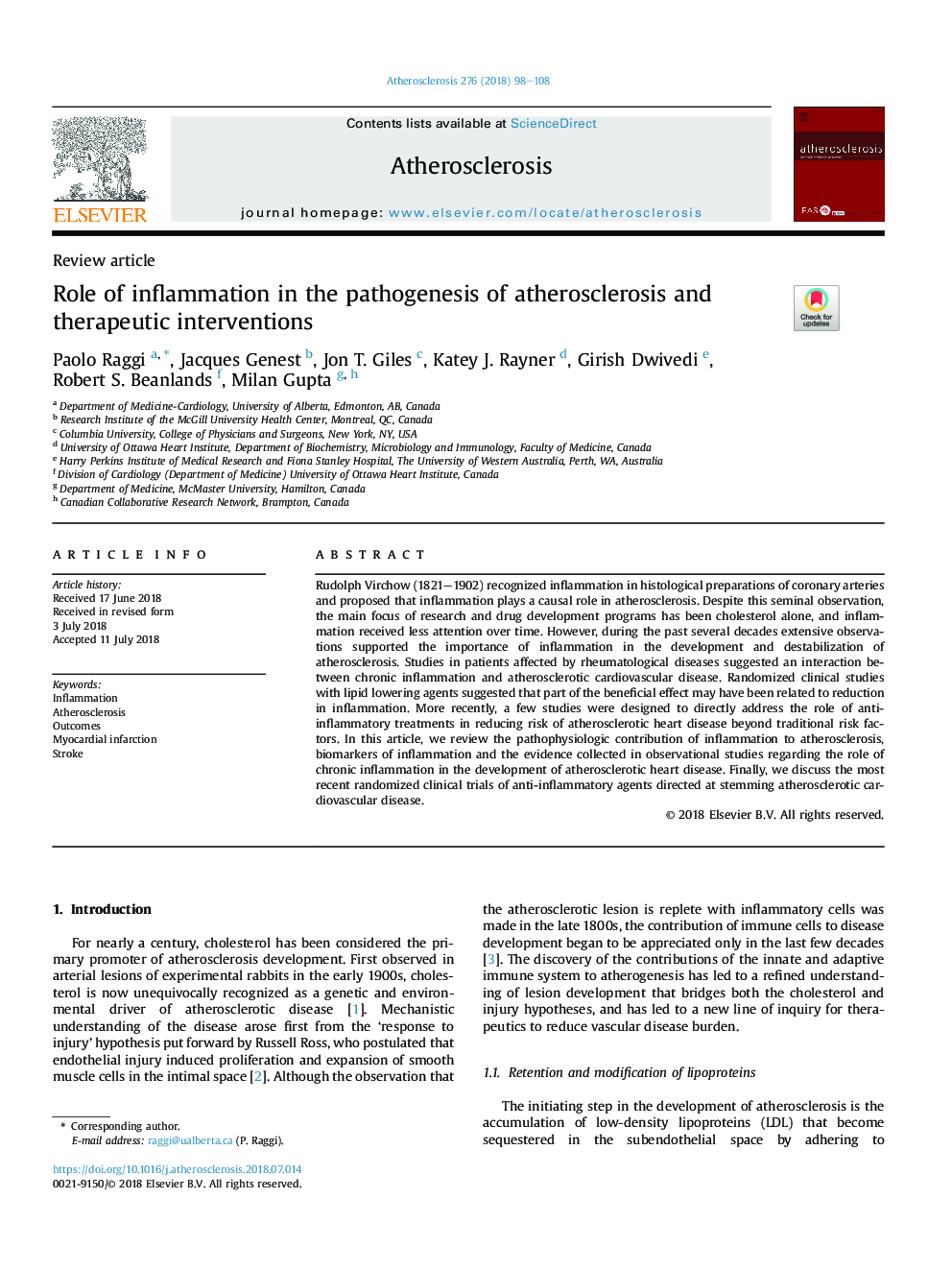| کد مقاله | کد نشریه | سال انتشار | مقاله انگلیسی | نسخه تمام متن |
|---|---|---|---|---|
| 8656624 | 1574689 | 2018 | 11 صفحه PDF | دانلود رایگان |
عنوان انگلیسی مقاله ISI
Role of inflammation in the pathogenesis of atherosclerosis and therapeutic interventions
ترجمه فارسی عنوان
نقش التهاب در پاتوژنز آترواسکلروز و مداخلات درمانی
دانلود مقاله + سفارش ترجمه
دانلود مقاله ISI انگلیسی
رایگان برای ایرانیان
کلمات کلیدی
التهاب آترواسکلروز، عواقب، انفارکتوس میوکارد، سکته مغزی
ترجمه چکیده
رودولف ویرچو (1821-1892) التهاب را در آماده سازی بافت شناسی شریان های کرونری تشخیص داده و پیشنهاد می کند که التهاب در بیماری آترواسکلروز نقش مهمی دارد. علیرغم این مشاهدات ذهنی، تمرکز اصلی برنامه های تحقیق و توسعه دارو، تنها کلسترول بوده و در طول زمان، التهاب کمتر مورد توجه قرار گرفته است. با این حال، در طول چند دهه گذشته مشاهدات گسترده از اهمیت التهاب در توسعه و بی ثبات شدن آترواسکلروز حمایت کردند. مطالعات در بیماران مبتلا به بیماری های روماتولوژیک، تعامل بین التهاب مزمن و بیماری های قلبی عروقی آترواسکلروز را نشان می دهد. مطالعات بالینی تصادفی با عوامل کاهش دهنده چربی نشان می دهد که بخشی از اثرات مفید ممکن است مربوط به کاهش التهاب باشد. اخیرا، چندین مطالعه به منظور بررسی مستقیم نقش درمان ضد التهابی در کاهش خطر بیماری قلبی آترواسکلروز در مقایسه با عوامل خطر سنتی طراحی شده است. در این مقاله، ما به بررسی مشارکت پاتوفیزیولوژیکی التهاب در بیماران مبتلا به آترواسکلروز، بیومارکرهای التهاب و شواهد جمع آوری شده در مطالعات مشاهده شده در مورد نقش التهاب مزمن در توسعه بیماری های قلبی آترواسکلروز می پردازیم. در نهایت، ما در مورد جدیدترین کارآزمایی های بالینی تصادفی عوامل ضد التهابی که به منظور جلوگیری از بیماری قلبی عروقی آترواسکلروتیک انجام می شود، بحث می کنیم.
موضوعات مرتبط
علوم پزشکی و سلامت
پزشکی و دندانپزشکی
کاردیولوژی و پزشکی قلب و عروق
چکیده انگلیسی
Rudolph Virchow (1821-1902) recognized inflammation in histological preparations of coronary arteries and proposed that inflammation plays a causal role in atherosclerosis. Despite this seminal observation, the main focus of research and drug development programs has been cholesterol alone, and inflammation received less attention over time. However, during the past several decades extensive observations supported the importance of inflammation in the development and destabilization of atherosclerosis. Studies in patients affected by rheumatological diseases suggested an interaction between chronic inflammation and atherosclerotic cardiovascular disease. Randomized clinical studies with lipid lowering agents suggested that part of the beneficial effect may have been related to reduction in inflammation. More recently, a few studies were designed to directly address the role of anti-inflammatory treatments in reducing risk of atherosclerotic heart disease beyond traditional risk factors. In this article, we review the pathophysiologic contribution of inflammation to atherosclerosis, biomarkers of inflammation and the evidence collected in observational studies regarding the role of chronic inflammation in the development of atherosclerotic heart disease. Finally, we discuss the most recent randomized clinical trials of anti-inflammatory agents directed at stemming atherosclerotic cardiovascular disease.
ناشر
Database: Elsevier - ScienceDirect (ساینس دایرکت)
Journal: Atherosclerosis - Volume 276, September 2018, Pages 98-108
Journal: Atherosclerosis - Volume 276, September 2018, Pages 98-108
نویسندگان
Paolo Raggi, Jacques Genest, Jon T. Giles, Katey J. Rayner, Girish Dwivedi, Robert S. Beanlands, Milan Gupta,
